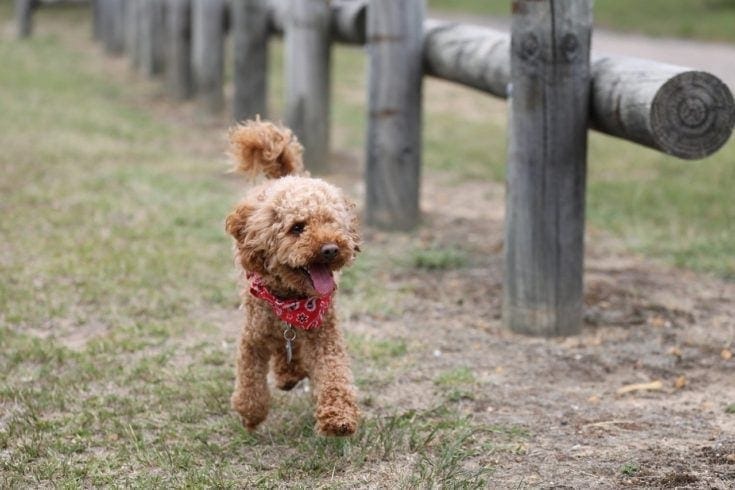How Long Do Toy Poodles Live? Vet Reviewed Average Lifespan, Data & Care

Updated on

Click to Skip Ahead
The Toy Poodle is the most petite member of the Poodle breed of dogs, and it’s one of the cutest as well! Toy Poodles are fun to own, clever, highly trainable, and adaptable. The small size of this dog breed also makes the Toy Poodle an excellent companion dog that’s travel-ready, as it’s possible to take your tiny friend nearly everywhere you go.
If you have a Toy Poodle, you’ve probably had a few questions about the breed now and then, and maybe even wondered how long toy poodles live on average. After all, you undoubtedly love your pup and want them to be around for a long time to share in your life’s adventures.
If your dog stays healthy, you can expect your Toy Poodle to be around for well over 10 years. We’ve put together some information here regarding how long toy poodles live as well as some lifespan data and facts.
What’s the Average Lifespan of a Toy Poodle?
Our friends at the American Kennel Club (AKC) tell us that the life expectancy of a Toy Poodle is anywhere between 10–18 years1. It should make you happy knowing the breed is a generally healthy one with a rather long life expectancy. Of course, some Toy Poodles don’t live so long and some live longer, depending on a few factors, which we’ll cover below.

Why Do Some Toy Poodles Live Longer Than Others?
Several factors can dictate the lifespan of a Toy Poodle, including:
1. Nutrition
When it comes to a Toy Poodle living a long and healthy life, nutrition plays a key role. If you feed a Toy Poodle a high-quality dog food packed with protein and limited carbohydrates, it will help the dog guard against obesity and other potentially life-threatening health problems.
2. Environment and Conditions
A Toy Poodle that is brought up in a safe, clean, and loving atmosphere stands a much better chance of living a long life than a Toy Poodle that doesn’t have it so good. A dog’s mental health plays a key role in the animal’s quality of life and longevity. A Toy Poodle like other dog breeds needs to feel loved, safe, cared for, and content.

3. Housing
A Toy Poodle, like other dog breeds, needs enough space to move around freely and play. Having proper housing conditions helps maintain good overall mental health, which, in turn, increases the chance of the dog staying healthy and happy.
A Toy Poodle that’s confined to a pen all day is usually an unhappy dog that feels anxiety and stress, which are two mental health issues that can wreak havoc on a dog’s overall health and longevity.
4. Size
Most Toy Poodles measure 10 inches or less at their shoulders and weigh between 6–9 pounds. As a small dog, it’s important for anyone owning a Toy Poodle to be wary of over-feeding their pet. Obesity can reduce a dog’s lifespan by several years. This is because overweight and obese dogs face higher risks of chronic illnesses like cancer and diabetes.

5. Sex
In a study comparing the effects of gender on the aging and longevity of dogs, it was suggested that males live slightly longer than females. The study also found that spayed and neutered dogs live longer and healthier lives due to various factors.
6. Genes
A dog’s genes can affect how healthy the animal is and how long it lives, and that is no different for the Toy Poodle. Hereditary diseases arise from genetic mutations in a breed, and Toy Poodles may experience thyroid issues, hip issues, and progressive retinal atrophy.

7. Breeding History
A responsible Toy Poodle breeder will only breed dogs that fall within the breed standard. Even the best-looking Toy Poodle may not be a good breeding candidate if the dog has health concerns affecting its longevity that can be passed on to future generations. An ethical breeder would never consider breeding two Toy Poodles that are related to one another because irresponsible breeding can lead to serious, life-threatening health problems.
8. Healthcare
Healthcare is critical to any dog’s well-being, including the Toy Poodle. Toy Poodles that are given proper healthcare are less prone to illnesses, which helps increase their lifespan. Healthcare involves taking your dog to the vet for any medical care it needs, including routine checkups. It also involves keeping your toy Poodle clean, well-fed, and well-groomed.

The 4 Life Stages of a Toy Poodle
Like people, dogs go through several stages of life starting with birth. The four life stages of a Toy Poodle include:
1. Puppyhood
Puppyhood for a Toy Poodle starts soon after birth and continues until the first 15 months of age. When the puppy is about 8 weeks old, it can leave its mother’s care and become adopted by a loving human family.
2. Adolescence
This stage of a Toy Poodle’s life starts around 18 months. This is when the reproductive hormones of the dog start making changes in the animal’s physical and mental behavior. It is during adolescence when the females of the breed go into heat and the males are interested in mating with the females. Like in humans, the adolescence stage can be trying for a Toy Poodle’s owner as the dog is discovering its limits while playing seemingly non-stop.

3. Adulthood
The adult stage of a Toy Poodle’s life starts after 20 months. This is when a Toy Poodle will be easier to manage compared to the adolescence stage. An adult Toy Poodle will enjoy spending time with its owner and going out for walks.
4. Senior
The senior stage begins after the completion of 6–8 years in a Toy Poodle’s life. This is when a dog may become less active and sleep more. Dental issues and urine incontinence are a couple of problems facing senior Toy Poodles.
 How to Tell Your Toy Poodle’s Age
How to Tell Your Toy Poodle’s Age
If you have adopted a Toy Poodle and don’t know how old it is, you can estimate its age. One thing to do is look at the dog’s teeth. A puppy will still have its small bright white baby teeth, while an older dog will have teeth that are larger and duller.
You can also look for visible signs of aging like gray hair around the muzzle. A Toy Poodle with a full gray muzzle is typically a senior dog, while one with a few gray patches will be around 5 years old. Another way to tell your Toy Poodle’s age is to watch your dog’s behavior. An adolescent Toy Poodle is generally more playful and sillier than an adult or senior.
Conclusion
If you’re the proud owner of an adorable Toy Poodle, you should be happy to know that these dogs have long lifespans. Of course, you must do your part to keep your dog healthy by feeding it quality dog food and providing it with basic good care. And don’t forget to provide your dog with plenty of mental and physical activities to keep its mind sharp and its body in tip-top shape!
Featured Image Credit: NDAB Creativity, Shutterstock



 How to Tell Your Toy Poodle’s Age
How to Tell Your Toy Poodle’s Age








